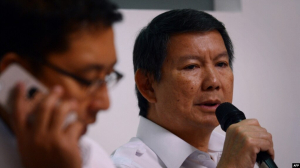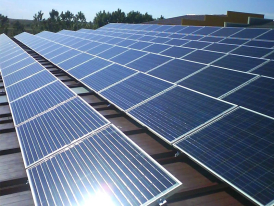Indonesia's renewable energy transition hindered by two key policies expert warns
As Indonesia strives towards its net-zero emission (NZE) target by 2060, or possibly sooner, two government policies have come under scrutiny for impeding the energy transition. However, eliminating such policies could impact electricity prices in Indonesia.
DMO and tariff policies hinder renewable energy development
Fabby Tumiwa, Executive Director of the Institute for Essential Services Reform (IESR), has identified these policies as the domestic market obligations (DMO) for coal, which sets a maximum coal price of US$ 70 per ton for electricity generation, and Indonesia's electricity tariff policy, which he believes doesn't allow room for PLN (the state-owned electricity company) or private power companies to expand their renewable energy capacity.
"Holding the coal price for electricity generation at US$ 70 per ton serves as an incentive to continue running coal-fired power plants. While renewables are becoming cheaper, policies like this make coal-generated electricity even cheaper," said Fabby on September 7, 2023.
Fabby acknowledges that eliminating such policies won't be easy, as it requires parliamentary approval. "This will require a significant effort and cooperation with parliament. It's not solely an executive decision," he stated.
Additionally, Indonesia is heading into a year of politics, with elections set for 2024. Consequently, revising these policies may not be feasible this year or the next.
The second policy concerns Indonesia's electricity tariffs, with the country having one of the lowest electricity tariffs in Southeast Asia. According to Fabby, this is a highly sensitive issue in Indonesia.
Low electricity tariffs make it challenging for renewable energy sources such as geothermal, large hydro, or hydroelectric power plants (PLTA) to compete due to their relatively higher generation costs.
"We need to address this electricity tariff issue so that PLN and IPPs can have room to invest in renewable energy projects. This requires significant investment, which PLN currently lacks," explained Fabby.
Indonesia's heavy reliance on coal-fired power plants (PLTU) in its electricity system, accounting for 70% of the energy mix in 2022, has posed challenges for the optimal utilization of abundant renewable energy sources. According to IESR, this dominance of PLTU is a key factor hampering the effective integration of renewable energy technologies.
Renewable energy continues to rise
Despite the hurdles, utility companies like PLN and independent power producers (IPPs) are considered anchors in renewable energy investment. Their combined contribution is estimated to reach 60% of the total expected investment of US$ 20 billion per year.
"With PLN's current financial situation, they are far from that figure. Therefore, reforming electricity tariff policies to provide utility companies with moderate returns could, I believe, boost clean energy investment in Indonesia," he added.
As per the Ministry of Energy and Mineral Resources (ESDM) data, installed capacity of renewable energy generators in the first half of 2023 reached 12.7 gigawatts (GW), accounting for around 15% of the total power generation capacity.
Hydropower (PLTA) remains the dominant source within renewable energy, with a capacity of 6.7 GW. This is followed by biomass at 3.8 GW, geothermal at 2.3 GW, solar at 322 MW, wind at 154 MW, and coal gasification at 30 MW.
Besides power generation, the utilization of renewable energy has been optimized through the 35% biodiesel blend (B35) program. Since the beginning of this year, the Ministry of ESDM reported a consumption of 5.67 million kiloliters. Additionally, biomass is also used in the co-firing program with PLTU, targeting operation at 52 locations by 2025.
However, Dadan Kusdiana, ESDM Secretary-General, highlighted that the progress in incorporating renewable energy sources into the country's energy mix has been relatively small, standing at just 13%. This figure falls short of Indonesia's 2025 target of gradually increasing the share of renewables to 23%.
Impact of DMO on electricity prices and export interests
The Russia-Ukraine war has had a significant impact on global coal prices. Several coal-producing countries, including China and India, have increased their production, leading to a drop in coal prices. In response to this decline, ESDM had set the Coal Reference Price (HBA) at US$ 305.21 per ton in January 2023 and lowered it further to US$ 277.05 per ton in February 2023.
As coal prices weaken, coal producers are expected to prioritize exporting their coal production. However, they also have obligations to supply coal to Indonesia's state-owned electricity company, PLN, as part of the Domestic Market Obligation (DMO).
Under the DMO, coal producers are required to supply 25% of their total production to PLN at a fixed price of US$ 70 per ton. Demand for coal from the electricity sector is projected to increase significantly in 2023, reaching 161.15 million tons, up from 115 million tons in 2022.
It's essential to note that the DMO is a government intervention aimed at protecting consumers from skyrocketing electricity tariffs. If PLN were to pay market prices for coal, it would undoubtedly increase the cost of electricity production (HPP). With higher HPP, the alternative would be to raise electricity tariffs, which would burden consumers.
Already have an account? Sign In
-
Start reading
Freemium
-
Monthly Subscription
30% OFF$26.03
$37.19/MonthCancel anytime
This offer is open to all new subscribers!
Subscribe now -
Yearly Subscription
33% OFF$228.13
$340.5/YearCancel anytime
This offer is open to all new subscribers!
Subscribe now






